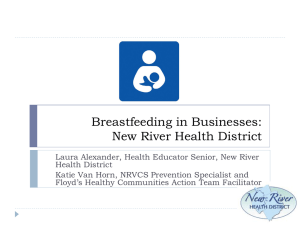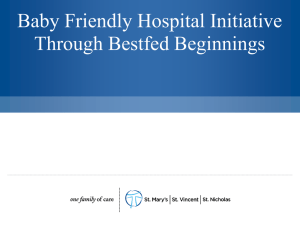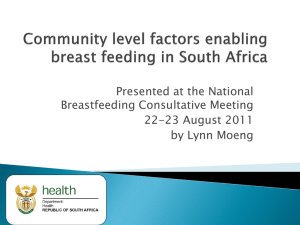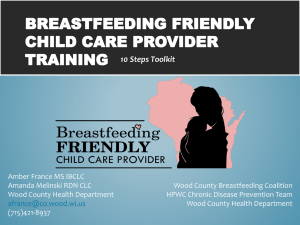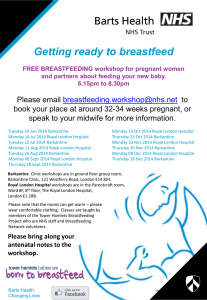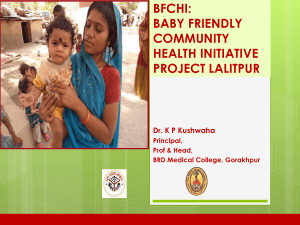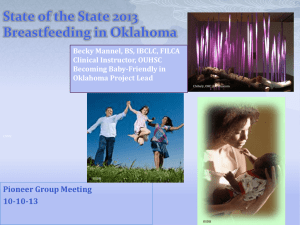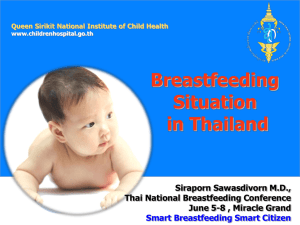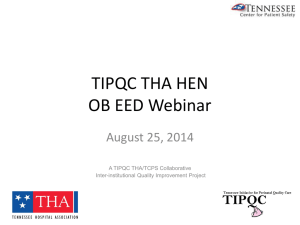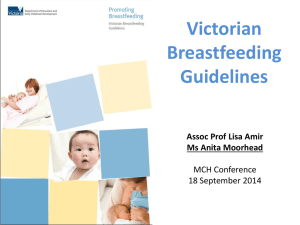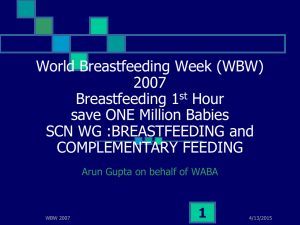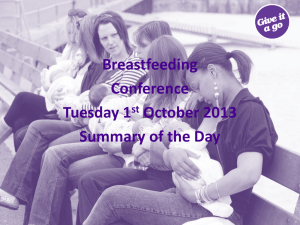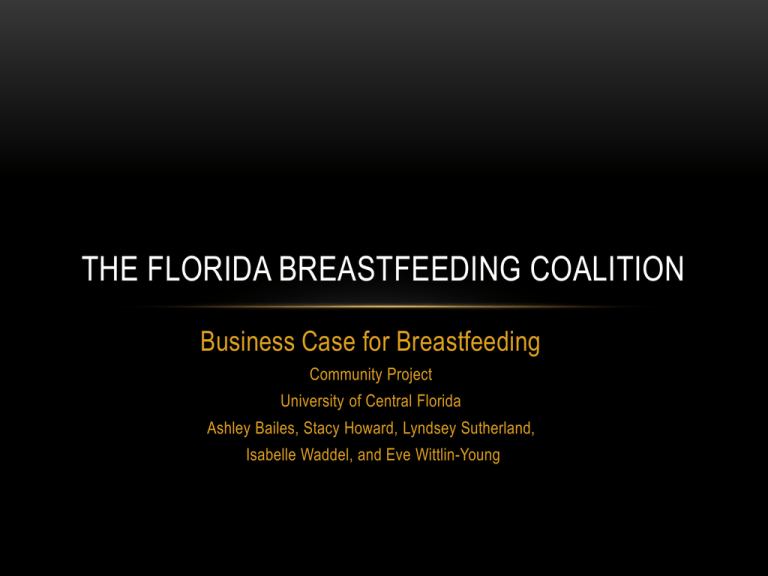
THE FLORIDA BREASTFEEDING COALITION
Business Case for Breastfeeding
Community Project
University of Central Florida
Ashley Bailes, Stacy Howard, Lyndsey Sutherland,
Isabelle Waddel, and Eve Wittlin-Young
BUSINESS CASE FOR BREASTFEEDING:
PLAN OF ACTION
• Implement a comprehensive lactation support program in businesses in
Central Florida
• Lactation support programs are aimed towards breastfeeding employees in
the workplace and include:
• Support from supervisors, employers, colleagues, and other mothers
• Flexible return to work options
• Education and access to professional lactation support
• Private room or space for the expression of milk during work hours
• Time and opportunity to express milk while at work
BENEFITS OF BREASTFEEDING
•
Breastfeeding decreases the incidence of a variety of infectious diseases in infants,
including gastrointestinal illnesses, bacteremia, pulmonary infections, and necrotizing
enterocolitis (NEC).
•
Saves money for family and community
•
Formula costs avg $1949 a year (30 ounces/day)
•
Excess of 2,033 doctor visits, 212 days in hospital, 609 prescriptions due to illness
caused from the immature immune system of the baby
•
3.6 billion dollar savings in US annual health costs
•
Decreases cancers for mom such as breast, uterine, and ovarian
•
Mothers have lower risk for CAD, DMII, Osteoporosis
•
Healthy babies = less missed work days for mom
•
Insurance benefits
IMPORTANCE OF A LACTATION PROGRAM IN THE
WORKPLACE
•
Working mothers are the fastest
growing population of the workforce
•
55% of full time employed
mothers have children that are
under the age of three
• Low breastfeeding rates in the
U.S. may be due to increasing
rates of women within the
workforce, and due to the lack of
a workplace lactation program
•
Breastfeeding benefits everyone
1.
Mothers: Decreased risk of
disease
2.
Babies: Decreased adverse
health events
3.
Employers: Decreased
employee absenteeism,
increased employee retention
4.
Society: Reduced economic
burden
COLLABORATING ORGANIZATIONS
Project Partner: The Florida Breastfeeding Coalition
• Business Case for Breastfeeding Toolkit
• Breastfeeding Friendly Employer Award
Target Employers and Companies:
• Universal Studios, Orlando
• Winnie Palmer Hospital for Mothers and Babies
GOALS
• Educate Universal Studios and Winnie Palmer Hospital on the importance
and benefits of breastfeeding
• Increase the awareness on ways breastfeeding can be promoted in the
workplace
• Raise existing awarded business standards and reach the highest
acceptable breastfeeding award
• Increase rates of the lactating staff by establishing a breastfeeding friendly
workplace
• Employed women will breastfeed to the recommended one year and will feel
supported in the workplace
COMMUNITY ASSESSMENT
2011 U.S.
National Average
2011 Florida
Average
Healthy People
2020 Goals
Mothers ever
having breastfed
74.6%
79.6%
81.9%
Mothers
breastfeeding at 6
months
44.3%
30%
60.6%
Mothers
breastfeeding at
12 months
23.8%
20.2%
34.1%
ASSESSMENT OF TARGET BUSINESSES
•
Universal Studios
• Popular Central Florida resort and theme park, located in Orlando, Florida
• “Committed to improving the quality of life where our guests and Team Members live,
work and play” (Universal Orlando Resort, 2012)
•
Winnie Palmer Hospital for Mothers and Babies
• Part of Orlando Health, located in downtown Orlando, Florida.
• Highest number of births in the state of Florida, with over 14,500 babies born
annually (Orlando Health, 2012)
• “To improve the health and quality of life of the individuals and communities we
serve” (Orlando Health, 2012)
EVIDENCE
•
77% reduction of lost work time related to infant illness ($60,000 annual savings)
•
72.5% increase in breastfeeding rates at 6 months (National average 21%)
•
62% fewer prescriptions
•
For each infant that a working mother breastfeeds the individual employer saves between
$331 and $471 in healthcare dollars
•
Cigna’s annual savings $240,000 healthcare expenses
•
Home Depot in Atlanta Georgia, established a lactation program that revealed a cost
savings of $42,000/year on average due to lower absenteeism rates
Heath Resources and Services Administration, n.d.
OUTCOMES
• Initial goals of starting a lactation program in Universal
Orlando and Winnie Palmer were not achieved
• In spite of vigorous efforts and communication
outreaches, both companies were uninterested in
the proposed project
• Many unforeseen goals were achieved
• Became proficient Business Case Outreach Workers
• Better understand all the barriers that working
mothers face to maintain breastfeeding
• Acknowledge the importance for supporting,
encouraging, and promoting breastfeeding
exclusivity for the health and wellbeing of mothers
and babies
FUTURE RECOMMENDATIONS
•
Business Case Outreach workers should start with finding a local business that is
interested in starting a lactation program
•
Sufficient time should be allotted to arrange meetings, educate employees, implement the
plan, and evaluate and maintain the program
•
All efforts should be made to introduce and expand this program to all organizations in
Central Florida and statewide as it has shown much success in other businesses when
implemented.
•
All efforts and advancements were forwarded to program director for the BCBF in order to
maintain contact, avoid redundancy, and provide support to businesses if requested in the
future.
REFERENCES
•
Agency for Healthcare Research and Quality. (2009).Breastfeeding and Maternal and Infant Health
Outcomes in Developed Countries. Retrieved March 22, 2012
fromhttp://www.ahrq.gov/clinic/tp/brfouttp.htm
•
American Academy of Pediatrics. (2005). Breastfeeding and the use of human milk. Pediatrics,
115(2), 496-506.
•
Ball, T. & Wright, A. (1999). Health care costs of formula feeding for the first year of life Pediatrics,
103(4), 870-876
•
Carothers, C., & Hare, I. (2010). The business case for breastfeeding. Breastfeeding Medicine,
•
5229-231. doi:10.1089/bfm.2010.0046
•
Florida Breastfeeding Coalition. (2009). Breastfeeding in the news. Retrieved March 3, 2012 from
http://www.flbreastfeeding.org/index.htm
•
Godfrey, J., & Lawrence, R. (2010). Toward optimal health: The maternal benefits of
breastfeeding. Journal of Women's Health. 19(9), 1597-1602. doi:10.1089/jwh.2010.2290
REFERENCES
•
Health Resources and Services Administration. (n.d.). The business case for
breastfeeding: Employer spotlights. Retrieved April 6, 2012 from
http://mchb.hrsa.gov/pregnancyandbeyond/breastfeeding/toolkit/employerspotlights.pdf
•
Mills, S. (2009). Workplace lactation programs: a critical element for breastfeeding
mothers' success. AAOHN Journal, 57(6), 227-231.
•
Ogbuanu, C., Probst, J., Laditka, S., Liu, J., Baek, J., & Glover, S. (2009). Reasons why
women do not initiate breastfeeding: A southeastern state study. Women's Health Issues,
19(4),268-278.
•
Orlando Health. (2012). Winnie Palmer Hospital for Women and Children: About us.
Retrievedon April 4, 2012 from
http://www.orlandohealth.com/winniepalmerhospital/AboutUs/AboutUs.aspx?pid=2576
•
Universal Orlando Resort. (2012). Join our team: Our main attraction. Retrieved on April
4, 2012 from http://www.universalorlandojobs.com/

